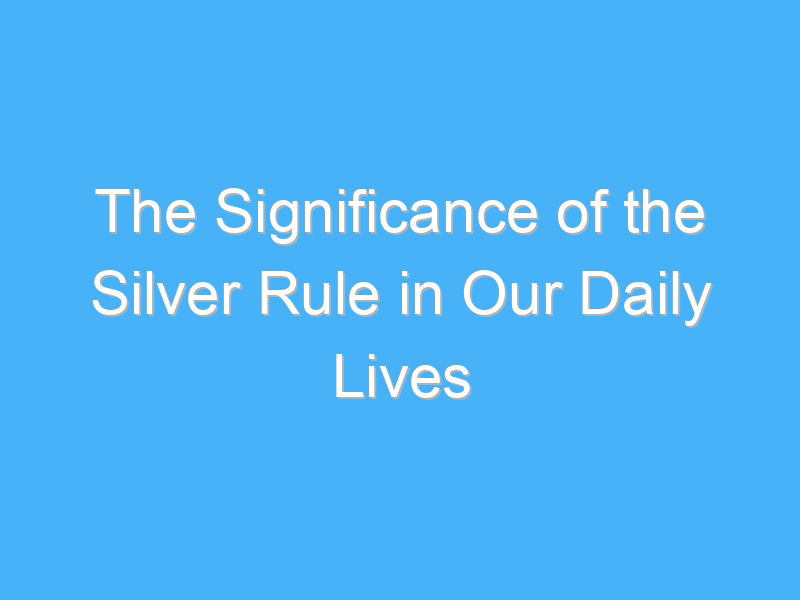
The Significance of the Silver Rule in Our Daily Lives
The silver rule is a principle that encourages individuals to treat others as they would want to be treated. It is often referred to as the “do unto others as you would have them do unto you” principle and is a variation of the more commonly known golden rule. While the golden rule is focused on treating others as you would like to be treated, the silver rule emphasizes the importance of considering what the other person would want and treating them accordingly. In this way, the silver rule promotes empathy and understanding in our interactions with others.
Silver Rule: Definition and Meaning
The Silver Rule is a principle that advocates for treating others as you would want them to treat you. It is akin to the Golden Rule, which states that one should treat others as they would like to be treated. The Silver Rule is a fundamental principle that can be applied in all aspects of our lives, from personal relationships to business dealings. It is a simple yet powerful concept that can foster empathy, understanding, and mutual respect.
The History of the Silver Rule
The Silver Rule is an ancient concept that can be traced back to various cultures and religions. It is a universal principle that has been embraced by many societies throughout history. The Silver Rule has been found in different forms in various cultures, including ancient Egypt, Greece, Rome, and China. It is also a fundamental principle in many religions, including Christianity, Judaism, Islam, Buddhism, and Hinduism.
Applying the Silver Rule in Our Daily Lives
The Silver Rule is a powerful principle that can have a profound impact on our lives. It is a simple yet effective way to foster positive relationships and promote goodwill. Here are some practical ways to apply the Silver Rule in our daily lives:
1. Show Empathy
The Silver Rule requires us to put ourselves in other people’s shoes and treat them with compassion and understanding. We should strive to be kind, considerate, and empathetic towards others, even when we disagree with them. By showing empathy, we can build stronger relationships with others and create a more harmonious society.
2. Practice Forgiveness
The Silver Rule also encourages us to forgive others as we would like to be forgiven. Forgiveness is a powerful tool that can help us let go of resentment, bitterness, and anger. By forgiving others, we can heal emotional wounds and move on from past hurts.
3. Be Generous
The Silver Rule also calls on us to be generous and giving towards others. We should be willing to share our time, resources, and talents with those in need. By being generous, we can make a positive difference in the lives of others and create a more compassionate society.
4. Listen Actively
The Silver Rule also requires us to listen actively to others and treat their opinions and ideas with respect. We should be willing to engage in constructive dialogue and be open to different perspectives. By listening actively, we can build stronger relationships and create a more inclusive society.
5. Practice Self-Reflection
Finally, the Silver Rule also calls on us to practice self-reflection and introspection. We should examine our own behavior and attitudes and strive to be the best version of ourselves. By practicing self-reflection, we can become more self-aware and improve our relationships with others.
FAQs – What is the meaning of silver rule?
What is the silver rule?
The Silver Rule is a principle of ethics similar to the Golden Rule, which is the idea of treating others the way you want to be treated. The Silver Rule, however, is more passive, and advises not to treat others in a way that you would not want to be treated. It implies that if you don’t want to be hurt or mistreated, you should not inflict the same on others.
Who invented the Silver Rule?
The exact origins of the Silver Rule are unclear. However, many philosophers and religious leaders, dating back to the ancient Greeks and Chinese, have advocated for it. Confucius, Buddha, and other spiritual leaders included the Silver Rule in their teachings.
How is the Silver Rule different from the Golden Rule?
The Golden Rule and Silver Rule are similar in that they both advocate treating others reasonably and respectfully. Both guide us to act in ways that prioritize the feelings and rights of other people. However, While the Golden Rule tells us to treat others the way we want to be treated, the Silver Rule advises against treating others in ways that we would not want to be treated. The Silver Rule takes a more passive stance, suggesting we abstain from causing harm as opposed to being actively kind.
Why is the Silver Rule important?
The Silver Rule encourages us to consider how our behavior affects others and to recognize the importance of avoiding cruelty and unkindness. It is an essential principle in developing healthy relationships, creating a peaceful society, and fostering an atmosphere of mutual understanding. When we follow the Silver Rule, we can be empathetic, compassionate, and considerate in our interactions with others, which is fundamental to building healthy and fulfilling relationships.
